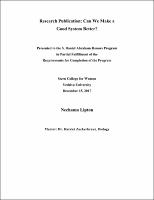Please use this identifier to cite or link to this item:
https://hdl.handle.net/20.500.12202/4180Full metadata record
| DC Field | Value | Language |
|---|---|---|
| dc.contributor.author | Lipton, Nechama | - |
| dc.date.accessioned | 2018-11-08T21:08:52Z | - |
| dc.date.available | 2018-11-08T21:08:52Z | - |
| dc.date.issued | 2017-12 | - |
| dc.identifier.uri | https://hdl.handle.net/20.500.12202/4180 | - |
| dc.identifier.uri | https://ezproxy.yu.edu/login?url=https://repository.yu.edu/handle/20.500.12202/4180 | |
| dc.description | The file is restricted for YU community access only. | - |
| dc.description.abstract | As part of the research team at CReATe Fertility Centre in Toronto during the summer of 2016, I unsuccessfully attempted to replicate an assay using a procedure published by another group of researchers. Specifically, initially promising results seen in the images derived from our experimental set proved to be identical to those seen in our control set. Studying the paper published by that research group to try to determine where I might have erred, I realized that the authors had failed to include images of their controls. It was puzzling how such a paper could have successfully passed peer review and been approved for publication. This piqued my interest in the crucial position peer review holds in ensuring that reputable and valid research is being released to other researchers and, ultimately, to the public. In this thesis, after summarizing my summer research project, I will review the literature on peer review focusing on its history and potential pitfalls. I will conclude that authors, reviewers, and journals have a three-way responsibility to ensure the success of the review process. I will use a series of criteria to compare the review policies of respected journals, as determined by impact factor, to examine whether there is a consensus among journals regarding certain peer review policies. Finally, I will discuss potential improvements to the peer review process. | en_US |
| dc.description.sponsorship | S. Daniel Abraham Honors Program | en_US |
| dc.language.iso | en_US | en_US |
| dc.publisher | Stern College for Women | en_US |
| dc.rights | Attribution-NonCommercial-NoDerivs 3.0 United States | * |
| dc.rights.uri | http://creativecommons.org/licenses/by-nc-nd/3.0/us/ | * |
| dc.subject | Research --Ability testing. | en_US |
| dc.subject | Peer review. | en_US |
| dc.subject | Academic writing --Publishing. | en_US |
| dc.subject | Academic writing --Evaluation. | en_US |
| dc.subject | Scholarly publishing. | en_US |
| dc.title | Research Publication: Can We Make a Good System Better? | en_US |
| dc.type | Thesis | en_US |
| Appears in Collections: | S. Daniel Abraham Honors Student Theses | |
Files in This Item:
| File | Description | Size | Format | |
|---|---|---|---|---|
| Nechama Lipton.pdf Restricted Access | 2.34 MB | Adobe PDF |  View/Open |
This item is licensed under a Creative Commons License

